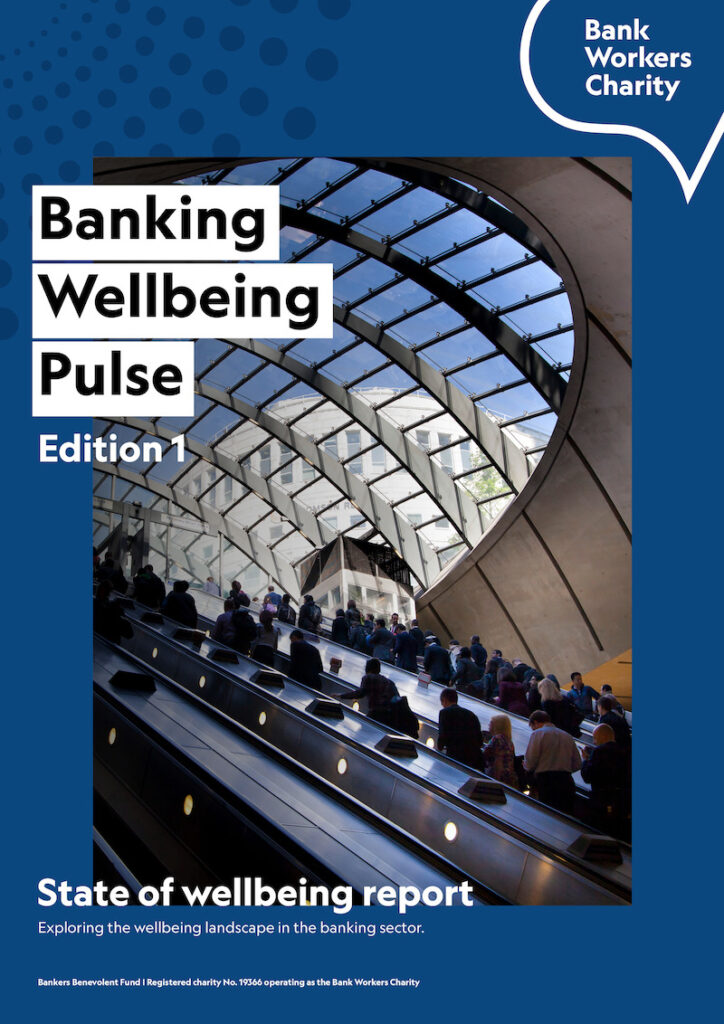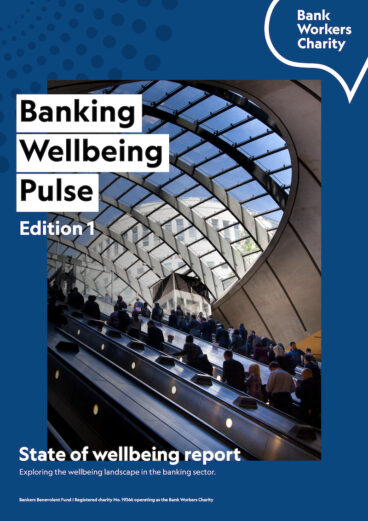As we’ve developed a richer understanding of the concept of wellbeing and the things that affect it, for good or for bad, workplace wellbeing strategies have expanded to embrace new concerns. Over the last 5 years, issues traditionally seen as no go areas for business, have become routine fixtures in the workplace wellbeing architecture.
The rise of financial wellbeing
Take financial wellbeing. In 2017, prompted by the number of employees seeking help from the charity, and seeing the direction of travel, the Bank Workers Charity, published a white paper, “Financial Wellbeing: time to do more”. In the years that followed, businesses came to recognise that financial concerns had a massive impact on employee wellbeing.
50
of UK employees were borrowing money on a regular basis to fund day-to-day living costs
Historically however, financial wellbeing was something businesses didn’t feel comfortable delving into. It was felt to be a private concern; one in which employees neither expected nor welcomed their employer’s involvement. Yet now, financial wellbeing is an integral feature of all workplace wellbeing strategies and the range of programmes to support it is growing all the time. This is a measure of how the wellbeing agenda has broadened out. But personal finance is only the most prominent example of wellbeing concerns, that businesses, with their greater commitment to employee wellbeing, now treat seriously.
These are emerging wellbeing themes and examples abound, from menopause to domestic abuse and from fertility to support for those living with cancer. All are issues that are beginning to feature in the wellbeing strategies of UK corporations. Now we’re going to look at some of them in a little more detail.
Menopause as a wellbeing concern
Menopause has probably been the most visible breakthrough issue of the last 2 years. Many businesses are now viewing it as an important wellbeing concern, and this is long overdue.
1/10
women aged 45-55 leave the workforce due to symptoms of menopause
45
feel that its symptoms had a negative impact on their work
Attitudes are undoubtedly changing but a recent industrial tribunal ruling tells us there is still some way to go. A woman was awarded £37,000 for harassment and unfair dismissal, after she’d been told “everybody gets menopause – just get on with it”,
The increased societal visibility of menopause is now being mirrored in the workplace. By April 2022, over 600 companies, many of them banks, had signed the menopause workplace pledge, committing as they did so, to offering support to their employees. It’s a measure of the traction the issue has gained, that the number of organisations committed to the pledge now exceeds 2,500.

Santander
Santander was one of the first companies in the UK to prioritise menopause, offering the Peppy app in 2019, as the centrepiece of a comprehensive support package. The app offers expert consultations, along with videos, live events, and private chats. The bank also created 25 menopause advocates to widen awareness of the support available.


NatWest too placed Peppy at the heart of their approach and did so with great success. 2000 staff signed up and over 30,000 messages have been sent to the apps’ menopause nurse since it was launched.
Cancer in the workplace
It may come as a surprise to see support for employees living with cancer included as an emerging wellbeing issue, when awareness of cancer has always been with us, and it remains the most feared of health concerns. And its prevalence – 1 in 2 of us will get cancer in our lifetime, means that at any moment, every large organisation will have significant numbers of employees living with the disease.
Yet only now is cancer beginning to feature in workplace wellbeing strategies. Why has it taken so long? Perhaps because people have shied away from discussing it; almost as if to talk about it is to increase the cancer risk. Or it may be because of the perceived enormity of cancer as a health issue; the huge numbers affected by it and the varieties of different cancers that can affect people; perhaps it has felt just too big to tackle.
Again, things have changed and businesses around the country are lining up to sign the Working with Cancer Pledge. A number of banks have done so, including Barclay’s, NatWest and Lloyds; all committing to creating a more open and supportive culture for employees living with the disease. The kinds of initiatives we’re now seeing include training to help line managers understand cancer and how to support colleagues with a diagnosis. Some banks run peer support groups for employees living with cancer, as well as for carers. It’s early days, but momentum is building around this issue, and we’ll see many more initiatives like this in the years ahead.


Fertility issues
Rather like menopause, fertility and pregnancy loss have not traditionally been discussed in UK workplaces. That has meant people struggling with these issues usually suffered in silence, expecting, and receiving little in the way of support. And its very invisibility within the workplace meant that the underlying realities around fertility were little known. Yet they are truly shocking.
1/4
pregnancies will end in pregnancy loss.
1/3
who experience pregnancy loss will go on to develop post-traumatic stress disorder.
Campaigning organisations like CIPD and The Fertility Network UK have done much to raise awareness of fertility as a workplace wellbeing issue, as have the actions of employee networks. Fortunately, these efforts have come together at a time when the workplace wellbeing agenda was already broadening out.
As a result, we’re seeing a range of responses from businesses. These include funding or part-funding of fertility treatments and the putting in place of special leave arrangements to take account of different fertility scenarios, including pregnancy loss, surrogacy, and adoption. And some businesses are offering egg freezing as part of their range of reproductive benefits to employees. A number of banks have made fertility a wellbeing priority, including Monzo, NatWest and Metrobank.





NatWest’s support saw them recognised by Working Families as best company for supporting fertility and pathways to parenthood. The bank’s employees can access discounts for certain fertility treatments or testing.
They’ve introduced training for line managers to help them better support colleagues and through Fertifa they provide access to educational materials on fertility and reproductive health. Wider support is also available through the bank’s Fertility and Loss employee network, which has over 600 members.
Enabling better access to health care
In recent years, NHS services have been under unprecedented pressure. The knock-on effect of COVID, combined with an ageing population, means our healthcare system is struggling to cope. According to NHS data, each month nearly five million patients in England wait more than two weeks for a GP appointment and many face very long waits for hospital treatment.
No surprise then that some corporations, Tesco only the most recent, are taking matters into their own hands and providing swifter access to healthcare. Some banks too have gone down this road, offering same or next day GP appointments and access to physios and OT’s. The recent shift towards less hierarchically structured employee benefits means that increasingly, private medical insurance (PMI) is available to all staff. The health pathways in PMI have widened too, with some banks negotiating with providers to make diagnosis for neurodiverse conditions part of the offer. This welcome development has opened up assessment for conditions like ADHD and autism to employees, when access through the NHS for adults could take up to 7 years. The difficulty in accessing dental care would suggest that this is an area that businesses many soon step into. With every indication that the NHS won’t be able to cope with the growing demand, we’ll surely see employers continue to plug gaps.
On the horizon
These are just some recently emerging wellbeing trends. Taboo issues like gambling and addiction are also starting to attract attention and are likely to be the subject of greater focus in the future. And with a growing body of evidence that the impact of digital technology is not entirely benign, more attention is surely going to centre on how we can get the best out of the technology, whilst minimising its wellbeing downside.
Next up in this edition…


